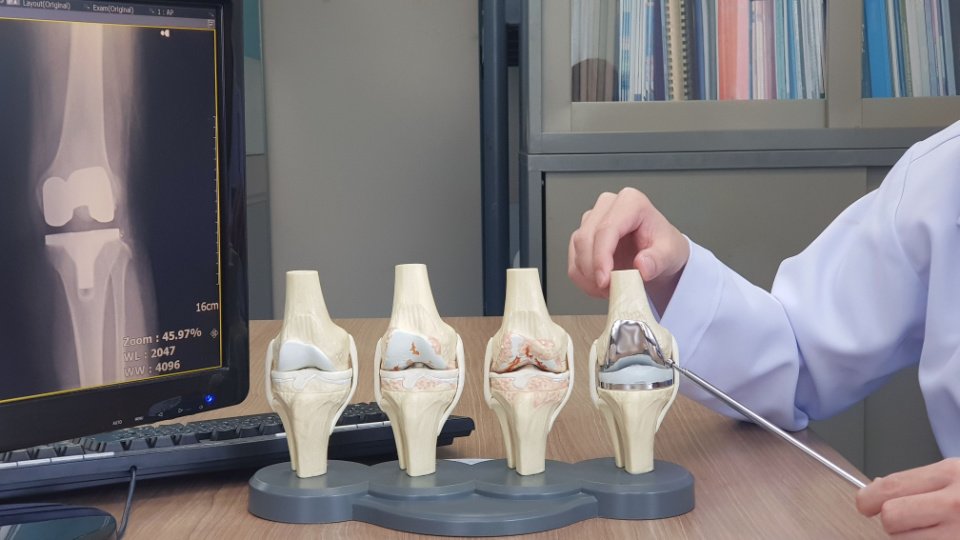Knee Joint Replacement
Orthopedic
If you’re looking for a life-changing remedy to overcome chronic knee pain and regain your freedom of movement, Knee Joint Replacement Surgery is the answer you’ve been searching for.
In most cases, patients suffer from almost unbearable pain and are severely limited in their mobility. All treatment options have already been exhausted, and the last hope for a “normal” life lies in the knee joint replacement.
Since the entire body weight rests on the knees during locomotion, the knee joint is one of the most important joints in our musculoskeletal system. A malfunction can be compensated for a while, but if the pain is unbearable, surgery is usually the last resort.
In this orthopedic operation, the surgeon will replace the natural knee joint, which can no longer perform its function properly, with an artificial one.
As a rule, such an operation lasts about 2–3 hours. It can be performed under general anesthesia or with spinal anesthesia. Your attending physician will decide with you which form of anesthesia is best for you.
During the knee joint replacement operation, the kneecap is moved to the side so that the surgeon can remove the anterior and – if necessary – the posterior cruciate ligament and cut out the damaged joint surfaces. The artificial joint is then inserted. After final testing of the function of the knee with the new joint, the operation is completed.

The lifespan of an artificial knee joint is about 15 years. One study showed that after 20 years, 90 percent of artificial knee joints were still intact, and after 25 years, 73 percent were still intact.
The hospital stay for knee joint surgery is a few days. After that, the rehabilitation phase begins, for which about 3–4 weeks can be expected. For most patients, physiotherapy is offered afterwards.
It depends very much on the individual situation of the patient how long it is necessary to walk with crutches after the operation. However, on average, 3–6 weeks can be expected.
After about 3 months, patients can usually return to work. It should be noted that activities that put a lot of stress on the knee joint should be avoided with an artificial knee joint. These include frequent kneeling, heavy lifting or working in a squatting position.
With more than 165,000 artificial knee joints implanted annually in Germany alone, the procedure is one of the most common operations in the field of orthopedic surgery.
All you need to know about orthopedic treatments is here, contact us!

FAQ
What is knee joint replacement?
Knee joint replacement, also known as total knee arthroplasty, is a surgical procedure that involves replacing a damaged knee joint with an artificial joint. It is typically recommended for individuals with severe knee pain and limited mobility caused by conditions like arthritis or injury. During the surgery, the damaged parts of the knee joint are removed, and metal and plastic components are implanted to recreate the knee’s natural function. Recovery for knee joint replacement involves rehabilitation and physical therapy to regain strength and mobility. While the surgery carries risks, it can significantly relieve pain and improve the quality of life for many patients.
What is the main reason for knee replacement?
The most common causes leading to knee replacement are osteoarthritis, where the protective cartilage wears down over time, rheumatoid arthritis, an autoimmune disease causing joint inflammation, post-traumatic arthritis resulting from a severe knee injury, and other conditions such as avascular necrosis or genetic disorders affecting the knee joint. The primary objective of knee replacement surgery is to relieve pain, enhance mobility, and improve the overall quality of life for patients who have exhausted non-surgical treatments and experience significant knee joint problems.
Is knee joint replacement painful?
The experience of pain during knee joint replacement surgery can vary from person to person. However, it’s important to note that the procedure is typically performed under anesthesia, which means you will not feel pain during the surgery itself. Anesthesia can be administered in different ways, including general anesthesia (where you are unconscious) or regional anesthesia (such as epidural or spinal anesthesia) that numbs the lower body while you remain awake.
After the surgery, it is common to experience some pain and discomfort in the knee region. The level of postoperative pain can vary depending on factors such as the individual’s pain threshold, the extent of the surgery, and the presence of any underlying conditions. However, healthcare providers aim to manage pain effectively by prescribing pain medications and utilizing other pain management techniques, such as local anesthesia, nerve blocks, or epidural catheters. These approaches help to control pain and promote a more comfortable recovery.
Are full knee replacements successful?
Full knee replacements are considered successful surgical interventions for individuals suffering from severe knee pain and limited function due to conditions like osteoarthritis or rheumatoid arthritis. The success of knee joint replacements can be evaluated based on pain relief, functional improvement, patient satisfaction, and the longevity of the prosthetic joint. Studies have shown that most patients experience significant pain reduction and improved quality of life following the surgery. Functionally, individuals often observe enhanced mobility and the ability to engage in daily activities with greater ease. Patient satisfaction rates are generally high, as knee replacements allow individuals to regain an active lifestyle and participate in recreational activities. Additionally, advancements in implant design and materials have improved the durability of prosthetic joints, with many lasting 15-20 years or more. While individual experiences may vary, overall, knee joint replacements have a high success rate in terms of pain relief, functional improvement, and patient satisfaction when performed by skilled surgeons and supported by proper postoperative care.
Contact us now in case you have any questions!
Types of Treatments
Request Form
Get your free consultation
- Need guidance and reassurance?
- Talk to a real person from MedClinics!
- Let's find the perfect doctor together.
